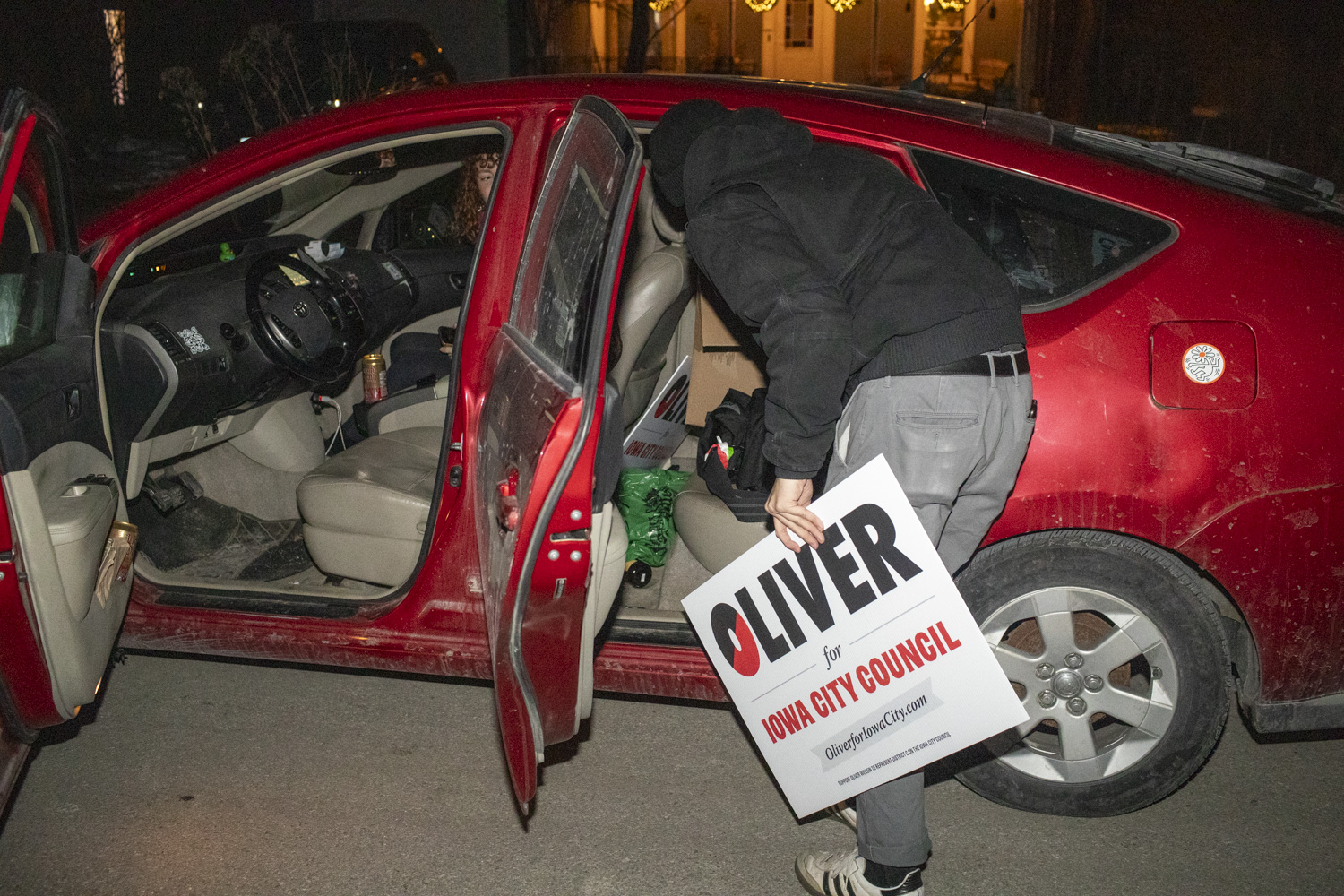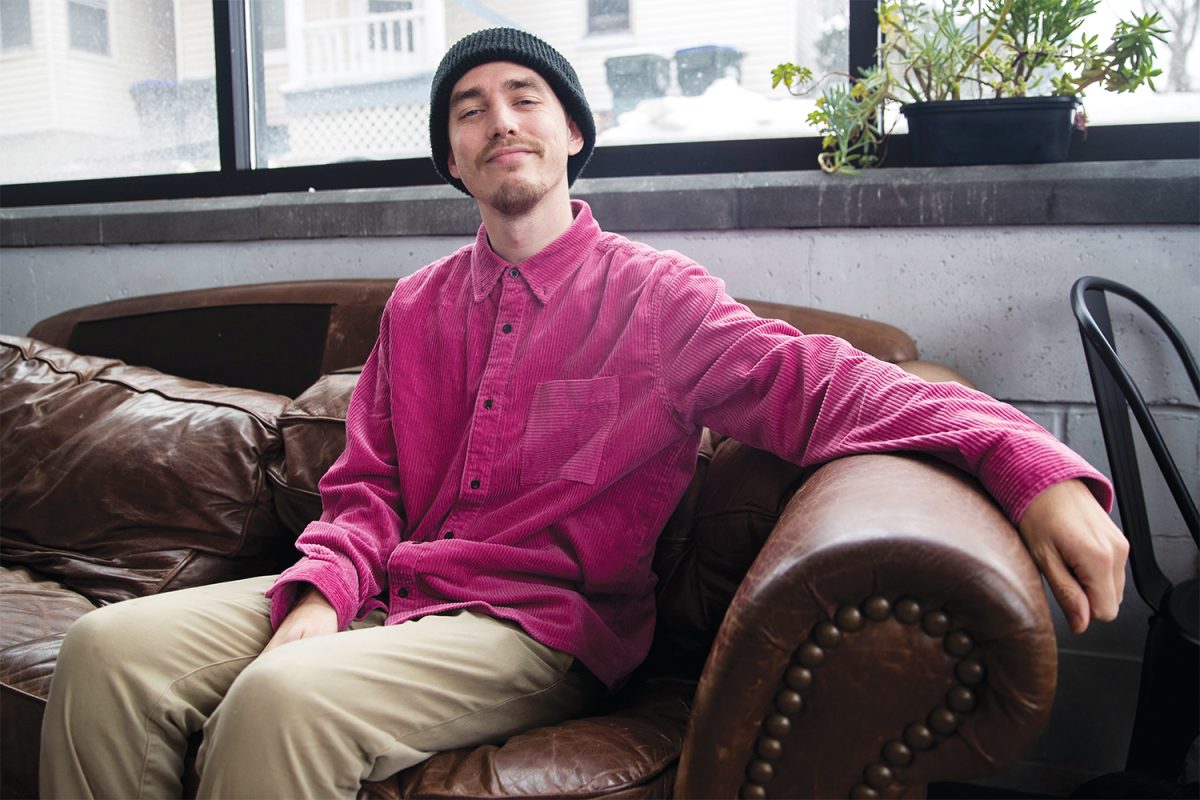Iowa City City Council candidate Oliver Weilein has just one apology for the social media rhetoric his opponent has called extremism.
Referring to a 2019 tweet in which he called ICE agents “pigs, evil fuc*ing traitors,” Weilein admitted the comparison was unfair. But not to the agents.
“I’m a vegan, so I would like to apologize to pigs,” Weilein said. “I volunteer at Iowa Farm Sanctuary, so a lot of the pigs are my homies.”
In addition to Iowa Farm Sanctuary, Weilein serves on the board of directors for Public Space One, is a founding member of the Iowa City Tenants Union, and regularly volunteers at the Emma Goldman Clinic.
Weilein also has a near-encyclopedic grasp of affordable housing models – armed with facts, statistics, and real-world examples to back slogans, like housing is a human right, that some might call lofty. Or even radical.
For Weilein, his political views are rooted in the simple belief that a better world is possible.
“People view competition and capitalism as human nature. It doesn’t have to be the case,” Weilein said. “Humans are capable of extreme good and extreme evil. It’s about how we structure society.”
Following former City Councilmember Andrew Dunn’s resignation at the start of the year, the Iowa City City Council special election comes as the Democratic Party faces a growing rift broadly. Centrist Democrats may push for cooperation with Trump’s administration while left-leaning reformists typically argue the party’s failure in the 2024 presidential election lies in its refusal to address the economic struggles of most Americans, resulting in the disillusionment of the party’s base.
Some might say Weilein and his opponent Ross Nusser, a property developer, are a microcosm of this greater rift. While both align with left-wing ideas, Nusser favors an institutionalist approach that works within existing power structures, and Weilein pushes for bold action that directly challenges those structures with the goal of securing tangible gains for the working-class, poor, and marginalized groups of people.
Weilein agreed with this characterization — but with one caveat.
“I don’t want to associate myself with the Democratic Party,” Weilein said. “There are people who feel like they can work within the Democratic Party and change it and have to work within the system. I’m not one of those people.”
While clarifying he doesn’t discourage anyone from voting in state or national elections, Weilein said he believes ground-up approaches to change — like grassroots organizing and radical unionism — will prove more effective than trying to improve the Democratic Party from within.
“The Democratic Party, at the end of the day, its class interests are that of the Republican Party,” Weilein said. “You have wealthy business owners that make up the Democratic Party, and they have many of the same donors [as Republicans].”
With an unapologetic distaste for electoral politics and hierarchical power structures, Weilein insisted he is not a politician and has no plans to use a city council seat as a springboard to higher office.
If elected, Weilein said he hopes to do locally what many feel the Democratic Party has failed to do nationally: use his position to improve the material conditions of people’s lives.
“Not only make their lives better, but to empower them through these improvements to make it easier for them to organize amongst themselves and to continue to advocate for themselves as working people or as oppressed people,” Weilein said.
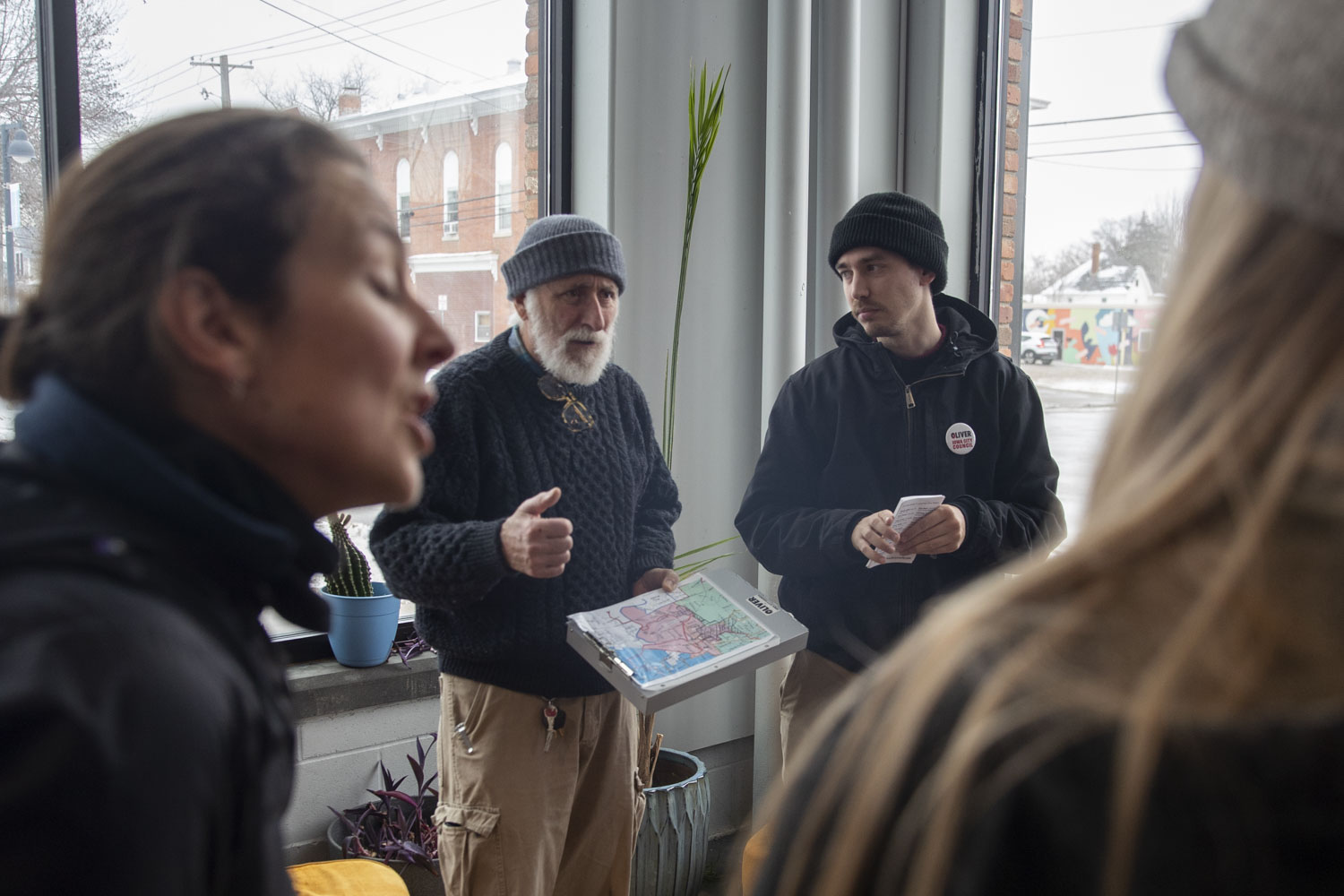
Oliver Weilein meets with volunteers during a canvassing event for Weilein’s City Council campaign on Saturday, Feb. 15, 2025. Ten volunteers split up to knock on doors across Iowa City to drum up support for the March 4 election. (Ava Neumaier)
Where punk meets policy
Growing up in a working-class family — his father a school bus driver and his mother an emergency room nurse — Weilein said he was always aware of how policy directly impacts groups like tenants and wage workers. However, it was his early interest in punk music that sparked Weilein’s awareness of systemic injustice and drive for grassroots activism, shaping the community advocacy work he has dedicated his adult life to.
“Punk is like a living way in which society could be different,” Weilein said. “Obviously going along with that, you’re exposed to so much left-wing politics. There’s always an anarchist zine table [at a punk show].”
After graduating high school in Cedar Falls, Weilein said he moved to Iowa City for the punk scene and the city’s progressive culture. Weilein still plays in two local punk bands — Bootcamp and Death Kill Overdrive — and has regularly performed shows to raise money for charitable organizations and mutual aid efforts.
In his free time, Weilein immerses himself in complex social and economic issues that interest him and is an avid reader — finishing over 130 books last year. Yet, despite his extensive knowledge, he never set foot in a college classroom.
“That was a very conscious choice,” Weilein said of his decision to forgo formal education.
Instead of taking the college route, he used his time to travel — playing punk shows in Iceland, hitchhiking across the deserts of Egypt, and exploring the world on his own terms. Weilein said his decision not to pursue a degree also means he lives on a modest income, sharing a rented apartment with his partner, Juliette, and their cat, Lilith. He works as a caregiver for adults with intellectual disabilities at Systems Unlimited — a role that may not come with a large paycheck, but one he takes pride in for the impact he has on the small group of clients he supports.
“It’s really good for the soul to know that when you go into work, no matter how hard it is, you’re doing something that is essential,” Weilein said. “It means a lot to me. These individuals that I’ve worked with for so long, my love for them grows every day, and our bond gets deeper.”
For Iowa City community organizer Amel Ali, it is Weilein’s lived experience that makes him such a worthy candidate for the city council seat.
“He is a renter. He makes minimum wage,” Ali said. “He understands what that’s like, what life most Iowa City [residents] have to live.”
Ali first met Weilein in 2020 during a surge of Black Lives Matter protests in Iowa City. She described him as someone who stands firmly against injustice while remaining measured, recalling how he routinely de-escalated tense situations and looked out for fellow protesters.
Weilein takes on a similar role at the Emma Goldman Clinic, volunteering as a frontline advocate — a position created to help ensure patient safety amid frequent anti-abortion protests outside the clinic.
“Oliver has always been one of the first people that is willing to rally and support and utilize his privileges to help other people,” Ali said. “I find that admirable.”
But his activism has come at a cost.
RELATED: UI Young Democratic Socialists of America hosts meet-and-greet with IC City Council candidate
Weilein is currently in the process of suing the University of Iowa Police Department for wrongful arrest after he attempted to join and document a pro-Palestine protest. Weilein said he arrived at the December 2023 demonstration at Kinnick Stadium after protesters had already been arrested. Shortly afterward, he was briefly detained when he went to the county jail where they were being held.
Weilein said officers released him after acknowledging he had violated no laws. He said he is now working with his attorney to push the UIPD to release body camera footage, which Weilein believes will confirm his account of the incident.
“It’s not the first time I’ve sued a police department,” Weilein said.
After Trump’s 2016 election, Weilein was arrested outside the White House during inauguration protests. Little Village Magazine reported he was the only Iowan among the 234 people detained that day. Weilein said he later joined a class-action lawsuit against the police department over their conduct, receiving a $4,000 payout — which he used to buy his vehicle.
Eventually, Weilein said his involvement in documenting and participating in Iowa City protests led to him and his partner receiving threats.
Their personal details, including his family’s address and his partner’s workplace, were posted online, and he said people showed up outside their window in the middle of the night. Ali confirmed the threats, and archived posts from Weilein’s X, formerly known as Twitter, account support his claims.
As a seasoned protestor, Weilein said he knew the risks of taking such a public role with local demonstrations but chose to do so anyway to protect the protest’s organizers.
“They were teenagers, they were children, and they were Black, and they were migrants,” Weilein said. “One of my biggest fears throughout that whole thing was them being targeted like I have been targeted in the past.”
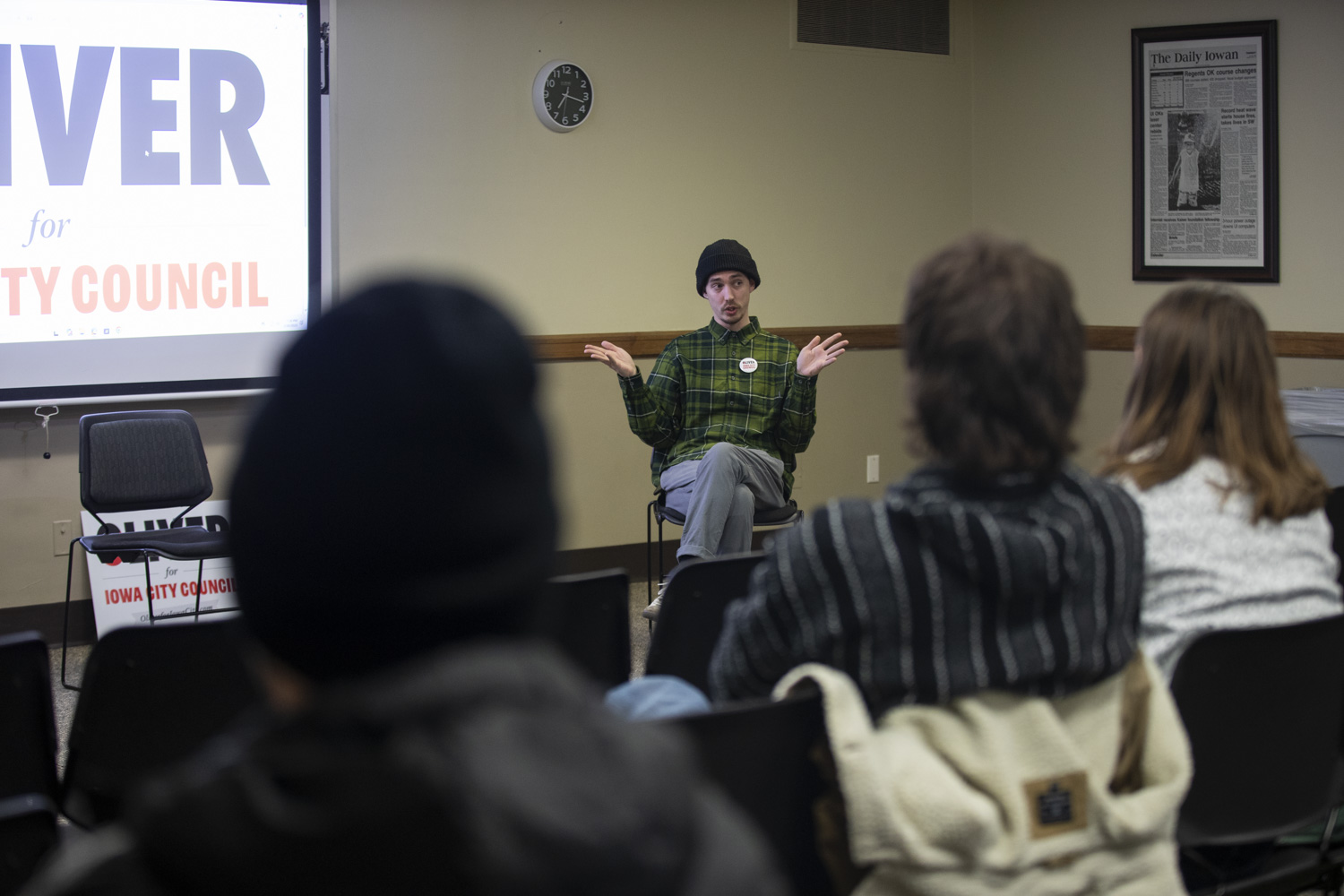
“Have fun with your opposition research”
In response to the threats, Weilein said he and his partner decided to purchase and train with firearms for protection. His ownership of an AR-15 rifle has drawn sharp criticism from both his opponent as well as current City Councilor Shawn Harmsen.
But Weilein said he opposes gun culture, despises the National Rifle Association, and has no violent tendencies. He said his decision to own a firearm was purely for protection, choosing an AR-15 because it was the most cost-effective option and the same type of weapon used in the threats against him and his partner.
At a Feb. 10 meeting with local advocacy group Moms Demand Action, Weilein’s opponent criticized his ownership of an AR-15. In response, Weilein called Nusser’s characterization a “disingenuous hit piece,” stating he had already explained his reason for owning a firearm.
The day after the heated meeting, Moms Demand Action member Temple Hiatt, a veteran and gun safety advocate, endorsed Weilein — a decision City Councilor Laura Bergus said speaks volumes.
“I know [Hiatt] has met with Oliver and spoken with him at length and is willing to put her credibility behind him,” Bergus said. “That’s all I need to know.”
Weilein’s social media posts — including images of burning an American flag at a barbecue, joking about the murder of UnitedHealthcare CEO Brian Thompson, and praising vandalism after the 2020 Black Lives Matter protests — have also drawn criticism. Bergus, however, said she doesn’t see the posts as an issue.
“I am a long time user of Twitter and understand how social media works and how people speak on the internet,” Bergus said. “So, I’m not concerned by [his posts] and his punk ideology. I think it’s been intentionally misconstrued to paint him as someone who he’s not.”
Not shying away from the issue, Weilein added a section to his X bio after launching his campaign that reads, “Have fun with your opposition research.” He has also refused to delete controversial posts, saying that would be dishonest.
“The way I’ve run my campaign, specifically, I don’t hide anything about myself,” Weilein said.
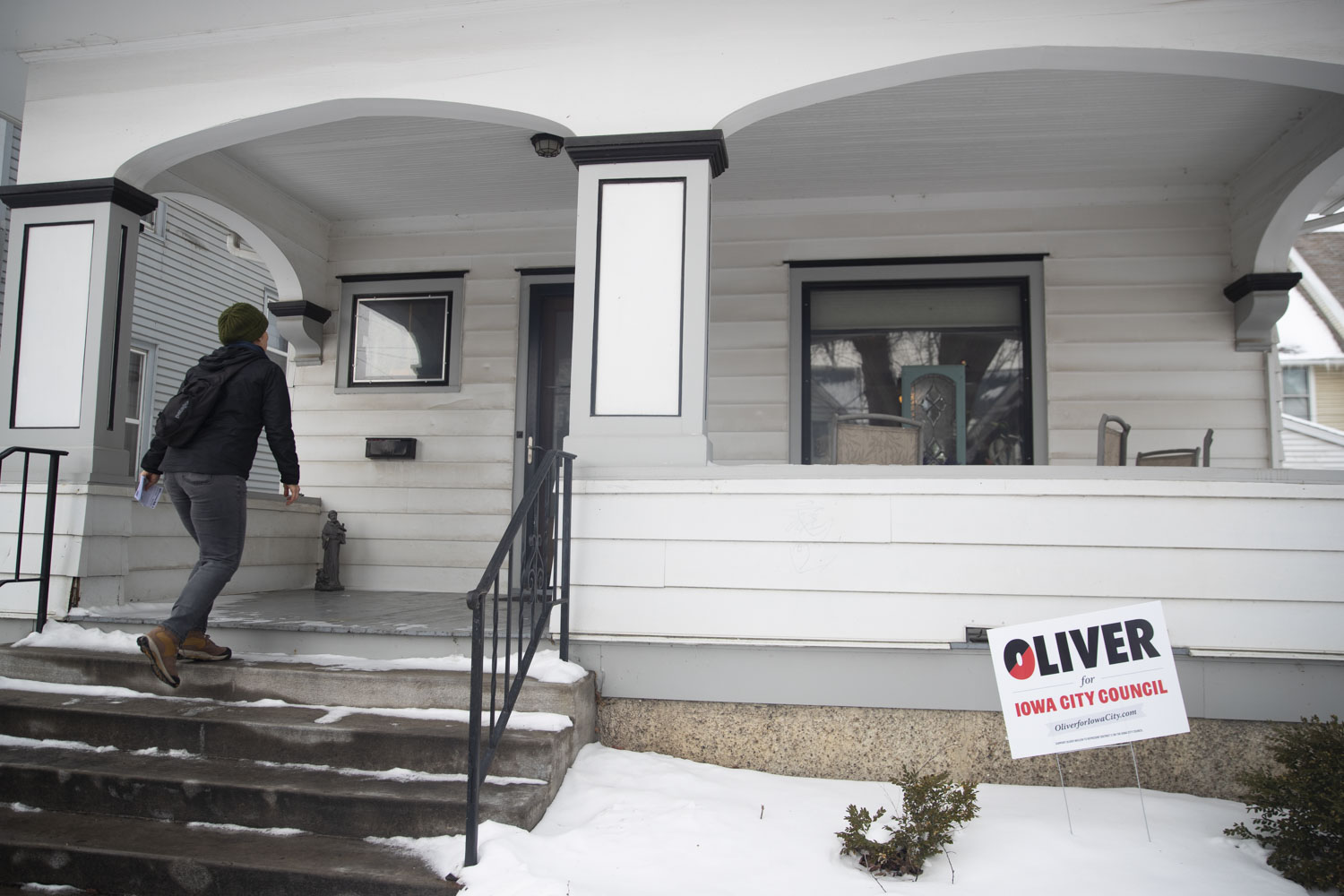
No war with the workers, no peace with the machine
While critics have called Weilein’s social media activity and positions — such as his pledge to fight ICE rather than comply with the agency — radical, Ali emphasized that marginalized communities see value in an elected official who is unwavering in his commitment to protect and advocate for them.
“It’s really easy to say that these things are radical when you come from a position where they don’t directly affect you,” Ali said. “I think that the time for cowering is not now.”
Ali said Weilein’s decisive primary win — taking nearly 70 percent of the vote in District C — shows voters are ready for a candidate who goes against the status quo.
Similarly, Bergus said she values Weilein for his unapologetic stances and personal commitment to protecting fellow residents from injustice. She added while some may view his rhetoric as inflammatory, she has found his interpersonal communication to be anything but.
“He’ll set aside differences of opinion,” Bergus said. “I’m sure he’ll do a good job working even with those who’ve been intentionally smearing him.”
Weilein has echoed that sentiment himself, emphasizing advocating for tenants doesn’t mean vilifying landlords and saying his disagreements with Nusser wouldn’t stop him from working together if it served the greater good.
But his willingness to collaborate has its limits. When it comes to what he sees as fascism, Weilein said there is no middle ground.
As many brace for what’s ahead — state crackdowns on protests, heightened immigration enforcement, and growing political uncertainty — Weilein remains true to his punk roots. He isn’t afraid to fight the law.
“There’s lots of things to be fearful for, but we can weather this by looking after each other in a very personal and community-minded way,” Weilein said. “We have more power than they want us to think.”
